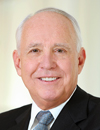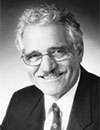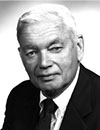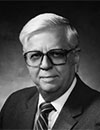AAMC Past Presidents
Darrell G. Kirch, MD
2006-2019

Dr. Darrell G. Kirch is president emeritus of the Association of American Medical Colleges (AAMC), which represents the nation's medical schools, their health systems and teaching hospitals, and related academic societies. He served as President and CEO of the AAMC from 2006 until 2019, when he was succeeded by Dr. David J. Skorton.
A distinguished educator, biomedical scientist, and clinician, Dr. Kirch speaks and publishes widely on the need for transformation in the nation’s health care system and how academic institutions can lead change across education, research, and health care for their communities and beyond. As a respected university leader, Dr. Kirch has chaired the Washington Higher Education Secretariat and served as a member of the American Council on Education Board of Directors. In 2007, he was elected to the National Academy of Medicine, and has been active in multiple initiatives of the National Academies. As an ardent champion for the well-being of the nation's health professions workforce, he currently serves as co-chair of the National Academy of Medicine Action Collaborative on Clinician Well-Being and Resilience. Dr. Kirch also serves as a member the Board of Regents of the American College of Psychiatrists.
Prior to becoming AAMC president, Dr. Kirch served as dean, university senior vice president, and academic health system leader of two institutions, the Medical College of Georgia and the Pennsylvania State University Milton S. Hershey Medical Center. He has co-chaired the Liaison Committee on Medical Education, the accrediting body for U.S. medical schools, and chaired the national AAMC Council of Deans.
A psychiatrist and clinical neuroscientist by training, Dr. Kirch began his academic career at the National Institute of Mental Health, becoming chief of the Schizophrenia Research Branch, serving as the acting scientific director in 1993, and receiving the Outstanding Service Medal of the United States Public Health Service. A native of Denver, he earned his BA and MD degrees from the University of Colorado, and in 2002 received the Silver and Gold Award from the University of Colorado Medical Alumni Association.
Jordan J. Cohen, MD
1994-2006

Jordan J. Cohen was born in St. Louis, Missouri, on June 18, 1934. He earned his BA from Yale University in 1956 and his MD from Harvard Medical School in 1960. From 1960 to 1965, he interned and completed his residency at Boston City Hospital, specializing in nephrology, and went on to serve as a research fellow in renal medicine at the New England Medical Center Hospital. After the end of his fellowship, he started the renal division at Brown University's medical school, where he taught until 1969.
Cohen was drafted into the army, and from 1969-71, he served as a lieutenant colonel in the U.S. Army Medical Corps at the Walter Reed Army Institute of Research.
He then served as head of the nephrology division at Tufts New England Medical Center for 11 years.
While at Tufts, Cohen was involved with several national medical organizations, including the Council of Medical Specialties and Board of Regents with the American College of Physicians.
In 1982, he served as the associate chairman of medicine at the University of Chicago Pritzker School of Medicine, where he worked for six years. There, Cohen became involved with the American Board of Internal Medicine, of which he was elected chair and served as such from 1993 to 1994. He also served as chair of the Residency Review Committee in Internal Medicine, which sets standards for training in internal medicine.
In 1988, he became dean of the Renaissance School of Medicine at Stony Brook University, which led to his involvement with the AAMC Council of Deans (COD). During his time on the council, he was a COD Administrative Board member and chair of the Task Force on the Generalist Physician.
Cohen became president of the AAMC in 1994, a position he held until 2006. During his tenure, he launched new initiatives in each of the association's mission areas (education, research, and patient care); expanded and modernized the AAMC's services for medical students, applicants, residents, and constituents; strengthened the association's communications, advocacy, and data gathering efforts; and established many initiatives for improving medical education and clinical care.
Cohen spoke extensively on the need to promote greater racial and ethnic diversity in medicine, uphold professional and scientific values, and transform the nation's health care system. He served as president emeritus at the AAMC during the year following his presidency. Cohen also taught medicine and public health at Georgetown University and The George Washington University.
Cohen is the author of more than 100 articles and has co-authored three textbooks and chapters in numerous other textbooks. He was the editor of Nephrology Forum from 1978 to 2005.
Robert G. Petersdorf, MD
1986-1994

Robert G. Petersdorf was born on Feb. 14, 1926, in Berlin, Germany, and arrived in the United States in 1928. After living in numerous places — including New York City, New York, and St. Louis, Missouri — Petersdorf graduated from high school in Los Angeles, California. He began undergraduate studies at the University of Wisconsin and concluded at Brown University, from which he graduated cum laude in 1948.
In 1952, Petersdorf graduated first in his class from Yale Medical School. He completed his residency training at Yale Medical School (1952-54) and Harvard Medical School (1954-55). He worked in a laboratory at Johns Hopkins University Medical School, studying infectious diseases, from 1955-57.
As chief resident at Yale Medical School from 1957-58, Petersdorf and his colleague Paul Beeson, MD, began studying a perplexing prolonged fever that was presented at morning rounds. They published a paper, Fever of Unexplained Origin: Report on 100 Cases, in 1961. This paper continues to be cited today, even though MRIs, CTs, and other scans have made some if its discoveries less relevant to current medical practice.
Petersdorf worked again at Johns Hopkins University from 1959-60 and then at the University of Washington from 1960-79. He served as president of Brigham and Women's Hospital in Boston, Massachusetts, and as professor of medicine at Harvard University from 1979-81. He was dean of the University of California, San Diego, School of Medicine from 1981-86.
From 1986-94, Petersdorf served as president of the AAMC. Some of his most important initiatives as president included arguing for limits on the number of weekly on duty hours required for residents, increasing the minority population in the medical field, and increasing the number of primary care physicians.
Petersdorf was known for his astounding memory and for his ability to work with people from diverse backgrounds. He died on Sept. 29, 2006, at the age of 80 in Seattle, Washington.
John A.D. Cooper, MD
1969-1986

John A. D. Cooper was born on Dec. 22, 1918, in El Paso, Texas, and grew up bilingual and bicultural in Las Cruces, New Mexico. He earned a bachelor's degree in chemistry from the New Mexico State University in 1939.
Cooper attended Northwestern University on a fellowship and earned his PhD in biochemistry in 1943. He continued at Northwestern University, serving as a biochemistry instructor from 1943-47 and as an assistant professor from 1947-51. During this time, he was not only an instructor at Northwestern, but also a student. He earned his MD from Northwestern in 1951.
For four months in 1956, Cooper lived in Brazil and taught the first courses for medical doctors there in radioisotopes and biology. Two years later, he taught the same classes in Argentina for four months. Noticing the lack of communication and consistency in training among the medical doctors in South America, Cooper suggested forming a federation among the medical schools. The idea was initially met with strong resistance, but the Pan American Federation of Associations of Medical Schools finally came to be in 1963. Cooper served on its board from 1963-76.
Cooper served in many roles over the years. He was associate dean of the Northwestern University Feinberg School of Medicine from 1959-63. From 1962-69, he served on the editorial board of the AAMC's Journal of Medical Education. He was also a member of the Illinois Board of Public Health Advisors and served as part of the Illinois Legislative Commission on Atomic Energy.
In 1969, Cooper was asked to become the first president of the AAMC. He was personally responsible for bringing the AAMC to the forefront of the public's attention by advocating for and securing the AAMC headquarters' move to Washington, D.C., and by seeking and cementing contacts within the federal government. In 1981, he was named by U.S. News and World Report as one of the five most influential people in medicine and health education. Cooper retired from his position as AAMC president in 1986.
Cooper died on Jan. 27, 2002, at the age of 84 in Birmingham, Alabama.